How Many Registered Gun Owners Are There In The United States Today
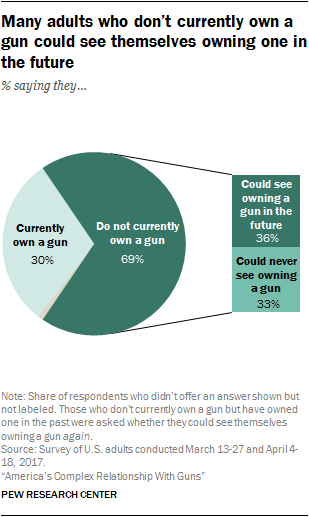 Understanding gun ownership in America is not as uncomplicated as knowing who does and does not ain a gun. Some Americans who don't personally own guns live with someone who does or may have endemic a gun in the past. And many who don't currently own a gun, including those who have never owned one, may be open to doing so in the future.
Understanding gun ownership in America is not as uncomplicated as knowing who does and does not ain a gun. Some Americans who don't personally own guns live with someone who does or may have endemic a gun in the past. And many who don't currently own a gun, including those who have never owned one, may be open to doing so in the future.
Three-in-ten American adults say they currently own a gun, and some other 11% say they don't personally ain a gun but alive with someone who does. Amidst those who don't currently own a gun, about half say they could encounter themselves owning one in the future.
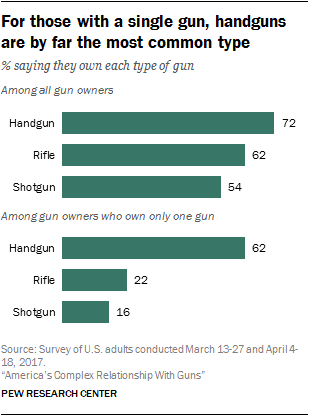 Gun ownership is more mutual among men than women, and white men are peculiarly probable to be gun owners. Amid those who live in rural areas, 46% say they are gun owners, compared with 28% of those who live in the suburbs and xix% in urban areas. There are also pregnant differences beyond parties, with Republican and Republican-leaning independents more than twice as likely as Democrats and those who lean Autonomous to say they ain a gun (44% vs. 20%).
Gun ownership is more mutual among men than women, and white men are peculiarly probable to be gun owners. Amid those who live in rural areas, 46% say they are gun owners, compared with 28% of those who live in the suburbs and xix% in urban areas. There are also pregnant differences beyond parties, with Republican and Republican-leaning independents more than twice as likely as Democrats and those who lean Autonomous to say they ain a gun (44% vs. 20%).
For many adults who own guns, exposure to guns happened at an early age. About ii-thirds of current gun owners (67%) say at that place were guns in their household growing upwards, and 76% report that they first fired a gun before they were 18. While non-gun owners are less probable to accept grown upward in a gun-owning household, a substantial share (40%) say this is the example, and almost half dozen-in-x (61%) say they have fired a gun.
Nigh gun owners cite multiple reasons for owning a gun. In fact, eight-in-ten say they take more than one reason for owning, and 44% have more than than one major reason. Still, protection tops the list, with 67% of electric current gun owners proverb this is a major reason they personally own a gun. About four-in-x say the same about hunting (38%), while iii-in-ten say sport shooting, including target, trap and skeet shooting is a major reason they own a gun. Fewer cite a gun collection (13%) or their task (8%) equally major reasons for owning a gun.
Two-thirds of gun owners say they own more than one gun, including 29% who ain 5 or more guns. Virtually 7-in-ten say they own a handgun or pistol (72%), while 62% own a burglarize and 54% own a shotgun. Among those who own a single gun, almost (62%) say that gun is a handgun or pistol, while far fewer say they own a burglarize (22%) or a shotgun (xvi%).
Measuring gun buying comes with its ain fix of challenges. For instance, unlike many demographic questions, there is not a definitive data source from the regime or elsewhere on how many American adults own guns.
The new survey asked about gun ownership differently than previous Pew Inquiry Center reports. Information technology nerveless responses online, where people may be more willing to share sensitive information than they would be over the telephone or in person. Furthermore, the survey was conducted among adults who have responded to Pew Research Center surveys in the past as part of the American Trends Panel and thus may be more comfortable answering the questions. Finally, it asked about gun ownership using two split up questions to measure personal and household ownership instead of collecting this information with a single question, equally has been the case with previous Pew Research Middle reports.
Despite these changes, the share of U.S. adults in the new survey who report that they personally ain a gun or who live with someone who does is similar to what the Center found in a survey conducted by phone in Baronial 2016. Both surveys are consistent with rates of gun ownership reported by the Gallup Organization, but somewhat college than that reported past the General Social Survey (GSS), which is conducted face up to face.
Gun ownership is almost common amid men, whites
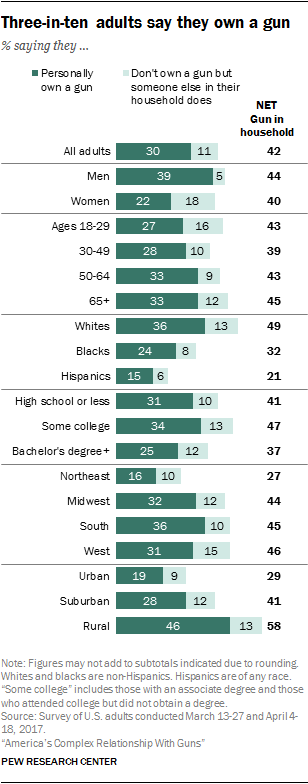 About four-in-ten adults (42%) report that in that location is a gun in their household, with three-in-ten saying they personally own a gun and eleven% saying they don't own a gun but someone else in their household does.
About four-in-ten adults (42%) report that in that location is a gun in their household, with three-in-ten saying they personally own a gun and eleven% saying they don't own a gun but someone else in their household does.
Gun ownership varies considerably across demographic groups. For instance, about 4-in-ten men (39%) say they personally own a gun, compared with 22% of women. And while 36% of whites written report that they are gun owners, nigh a quarter of blacks (24%) and 15% of Hispanics say they ain a gun.
White men are specially likely to be gun owners: Near half (48%) say they ain a gun, compared with virtually a quarter of white women and nonwhite men (24% each) and 16% of nonwhite women.
Like the gender gap, the education gap in gun ownership is particularly pronounced amongst whites. Overall, well-nigh 3-in-ten adults with a high school diploma or less (31%) and 34% of those with some college educational activity say they ain a gun; a quarter of those with a bachelor's caste or more say the same. Amidst whites, about four-in-x of those with a high school diploma or less (40%) or with some college (42%) are gun owners, compared with roughly a quarter of white college graduates (26%). There is no pregnant departure in the rate of gun ownership across educational attainment among nonwhites.
Regionally, Northeasterners stand out as the least probable to own guns: xvi% of adults who live in the Northeast say they ain a gun, nearly one-half the share who say this in the S (36%), Midwest (32%) and West (31%).
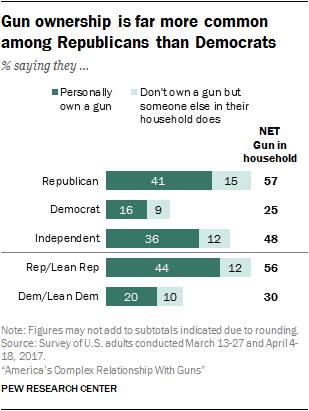 Beyond all regions, gun ownership varies considerably between those who live in rural and urban areas, with rural dwellers far more than likely than those who alive in urban areas to say they own a gun. Overall, 46% of Americans who alive in rural parts of the land own a gun, compared with 28% of those who live in the suburbs and nineteen% of those in urban areas.
Beyond all regions, gun ownership varies considerably between those who live in rural and urban areas, with rural dwellers far more than likely than those who alive in urban areas to say they own a gun. Overall, 46% of Americans who alive in rural parts of the land own a gun, compared with 28% of those who live in the suburbs and nineteen% of those in urban areas.
Besides demographic differences, clear partisan divides emerge when it comes to gun ownership. Republicans and Republican-leaning independents are more than twice as likely every bit Democrats and Autonomous-leaning independents to say they ain a gun (44% vs. 20%). This partisan gap remains even later controlling for demographic differences.
Amid the xi% of Americans who don't personally own a gun but alive in a gun-owning household, relatively few (19%) say they always apply the gun or guns in their household.
Most gun owners could never run across themselves not owning a gun
Roughly three-quarters of Americans who currently own a gun (73%) say they can't see themselves always not owning one, and this is the instance among majorities of gun owners across demographic groups.
Perhaps not surprisingly, those who see owning a gun as central to their overall identity are particularly committed to gun ownership. For case, 89% of gun owners who see owning a gun as very or somewhat important to their overall identity say they tin can't see themselves ever not owning a gun, compared with 58% of those who say owning a gun is not too important or not at all important their sense of identity.
And while 85% of gun owners who say the correct to ain guns is essential to their sense of freedom say they can't run across themselves always non owning a gun at some point, 41% of those who don't see the right to ain guns every bit essential say the same.
Many non-gun owners are open to owning a gun in the time to come
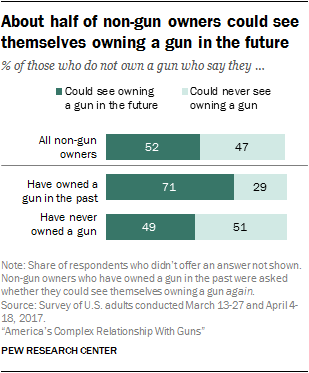 In add-on to the iii-in-ten adults who currently own a gun, another 10% say they take owned 1 in the past; 58% say they have never owned a gun.
In add-on to the iii-in-ten adults who currently own a gun, another 10% say they take owned 1 in the past; 58% say they have never owned a gun.
Many adults who don't currently own a gun say they could run into themselves owning ane at some point. In fact, 52% of all not-gun owners – and 71% of those who have owned a gun in the past – say they could see themselves owning a gun in the hereafter.
Consequent with patterns in gun buying, a higher share of men than women who don't currently own guns say they could see themselves doing so at some point; 62% of men who don't own guns say this is the case, compared with 45% of women. And while 62% of non-gun owners who alive in rural areas say they could run across themselves owning a gun at some point, smaller shares of those who live in a suburban (49%) or urban (50%) areas say the same.
Two-thirds of gun owners cite protection as a major reason for owning a gun
Most gun owners cite more than than i reason for owning a gun, but protection tops the listing, with 67% of gun owners saying this is a major reason they personally own a gun. Nearly four-in-x (38%) say hunting is a major reason they ain a gun, while three-in-ten cite sport shooting, including target, trap and skeet shooting. Fewer gun owners cite a gun collection (xiii%) or their job (8%) as major reasons.
Men and women are about equally likely to say protection is a major reason they own a gun: 65% and 71%, respectively, say this is the case. But higher shares of male than female person gun owners say hunting (43% of men vs. 31% of women) and sport shooting (34% vs. 23%) are major reasons they personally own a gun.
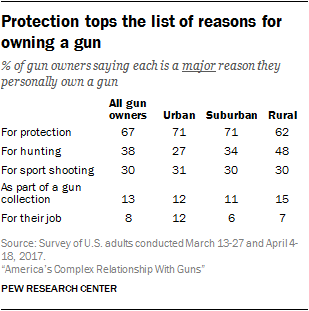 For the about part, gun owners in urban, suburban and rural areas offer like reasons for owning guns. For example, about seven-in-10 of those who alive in urban or suburban areas say protection is a major reason they ain a gun (71% each), as do most gun owners in rural parts of the country (62%). And across community types, about 3-in-10 cite sport shooting as a major reason.
For the about part, gun owners in urban, suburban and rural areas offer like reasons for owning guns. For example, about seven-in-10 of those who alive in urban or suburban areas say protection is a major reason they ain a gun (71% each), as do most gun owners in rural parts of the country (62%). And across community types, about 3-in-10 cite sport shooting as a major reason.
When it comes to hunting, however, rural gun owners are far more than probable than their urban or suburban counterparts to say it is as an of import reason they ain a gun; 48% of gun owners in rural areas say this, compared with 34% in the suburbs and 27% in urban parts of the country.
Interestingly, gun owners who run across their local community every bit unsafe are not significantly more likely than those who say they live in a safe community to say protection is primal to why they own a gun. About three-quarters of gun owners who say the customs where they live is not too rubber or not at all safety (74%) – and 66% of those who say they live in a community that is very or somewhat safe – cite protection as a major reason they ain gun. In that location is a significant link, yet, between owning a gun for protection and perceptions of whether the world, broadly speaking, has become more unsafe. While virtually seven-in-10 gun owners who say the world has become more dangerous cite protection as a major reason they own a gun (72%), half of those who don't see the world that style say protection is central to why they own a gun. Overall, 69% of all U.S. adults – and 75% of those who ain a gun – say the globe has become a more dangerous place.
Nigh ii-thirds of gun owners own more than than one gun
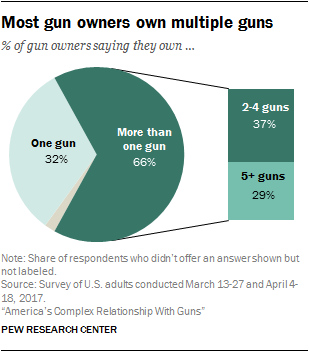 Most gun owners (66%) say they ain more than than one gun, with about three-in-ten (29%) maxim they ain five or more guns. This is, perhaps, not surprising, considering that eight-in-ten gun owners cite more than one reason for owning a gun – including 44% who say there is more than i major reason – and may need unlike types of guns for different purposes. In fact, nearly gun owners who cite just one reason for owning a gun say they own a single gun (65%); in contrast, 74% of those who say they own a gun for more than than one reason study having at least ii guns.
Most gun owners (66%) say they ain more than than one gun, with about three-in-ten (29%) maxim they ain five or more guns. This is, perhaps, not surprising, considering that eight-in-ten gun owners cite more than one reason for owning a gun – including 44% who say there is more than i major reason – and may need unlike types of guns for different purposes. In fact, nearly gun owners who cite just one reason for owning a gun say they own a single gun (65%); in contrast, 74% of those who say they own a gun for more than than one reason study having at least ii guns.
Men are particularly probable to own multiple guns: Nigh 3-quarters of male gun owners (74%) say they ain 2 or more guns, compared with 53% of female gun owners. This reflects, in part, the fact that men who ain guns are more probable than their female counterparts to have more than one reason for doing and then. Yet, even later on controlling for the number of reasons they own a gun, male gun owners remain more likely than their female counterparts to ain multiple guns.
Overall, about seven-in-ten gun owners say they own a handgun or pistol (72%), while 62% own a rifle and 54% ain a shotgun. While similar shares of male and female gun owners own a handgun (73% and 71%, respectively), rifles and shotgun are more popular amongst men. Roughly seven-in-10 male gun owners (69%) say they ain a rifle and 60% own a shotgun, compared with 50% and 44% of women who ain each type of gun, respectively.
Amongst gun owners with simply ane gun, handguns are past far the well-nigh common type of gun: 62% say this is the type of gun they own, while 22% own a burglarize and 16% ain a shotgun.
Nearly gun owners say there were guns in their household growing up
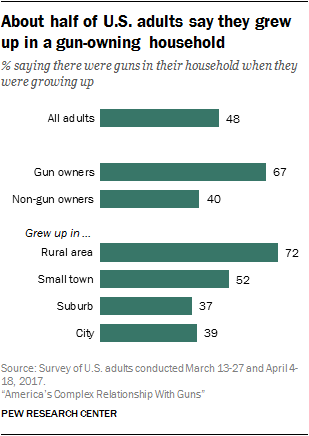 Adults who describe the community where they grew up equally rural are particularly likely to accept grown up with a gun in their household: 72% in this group say this is the example. Still, a substantial share of those who grew upwards in a small-scale boondocks (52%), a suburb (37%) or a city (39%) say guns were present in their abode when they were growing upwardly.
Adults who describe the community where they grew up equally rural are particularly likely to accept grown up with a gun in their household: 72% in this group say this is the example. Still, a substantial share of those who grew upwards in a small-scale boondocks (52%), a suburb (37%) or a city (39%) say guns were present in their abode when they were growing upwardly.
Regardless of the type of community they lived in growing up, adults who grew up with guns in their households are far more likely than those who did not to be gun owners themselves. About four-in-x who grew up in a gun-owning household say they currently own a gun (42%), compared with 19% of those who didn't abound up with guns in their household. While this difference is most pronounced among those who grew upwards in rural areas – 48% of those who grew upwards with guns at present own a gun vs. 12% of those who didn't grow up with guns in their household – it is likewise evident amid those who grew up in small-scale towns, suburbs or cities.
Amidst not-gun owners, nearly half-dozen-in-ten of those who grew up in a gun-owning household say they could come across themselves owning a gun at some signal (61%). Of those who didn't grow upwardly with guns in their household, smaller shares say the aforementioned (46%).
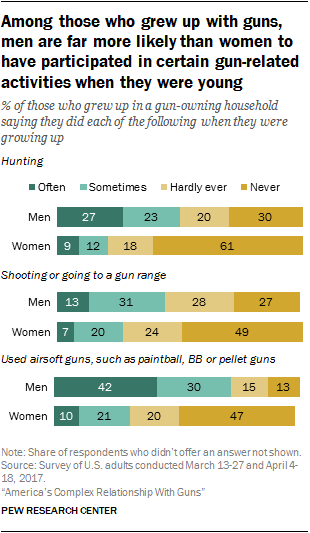 Reasons for having had guns in the household growing upwards vary considerably across customs type. For example, eight-in-ten adults who grew upwards in a gun-owning household in a rural expanse cite hunting as a reason there were guns in their household, while fewer cite protection (57%) or sport shooting (51%). In contrast, seven-in-ten of those who grew up in a gun-owning household in a city say at that place were guns in their household for protection; about one-half cite hunting (51%) or sport shooting (50%) as reasons there were guns in their household growing up.
Reasons for having had guns in the household growing upwards vary considerably across customs type. For example, eight-in-ten adults who grew upwards in a gun-owning household in a rural expanse cite hunting as a reason there were guns in their household, while fewer cite protection (57%) or sport shooting (51%). In contrast, seven-in-ten of those who grew up in a gun-owning household in a city say at that place were guns in their household for protection; about one-half cite hunting (51%) or sport shooting (50%) as reasons there were guns in their household growing up.
Protection is cited far more than frequently by adults younger than 30 than their older counterparts as a reason there were guns in their household growing upwardly. About 8-in-ten young adults who grew upward in a gun-owning household (79%) say this was a reason, compared with 66% of those ages 30 to 49, lx% of those ages fifty to 64, and just 34% of those ages 65 and older.
By contrast, older Americans who grew upward in a gun-owning household are far more likely than younger adults who grew up with guns to bespeak to hunting as a reason guns were present in their household. About 8-in-ten of those ages 65 and older (84%) and 73% of those ages 50 to 64 cite hunting as a reason; a narrower majority of adults ages 30 to 49 who grew up in a gun-owning household (sixty%) and nigh half of those younger than xxx (52%) cite hunting.
Higher shares of men than women who grew up with guns in the household say they participated in certain gun-related activities
While men and women are every bit likely to say there were guns in their household growing up, men who grew upward in a gun-owning household are far more than probable than their female counterparts to say they went hunting or shooting when they were growing upwards. About half of men who grew upward with guns in their homes say they went hunting oftentimes (27%) or sometimes (23%). Among women who grew up in a gun-owning household, nearly one-in-five (22%) say they went hunting at least sometimes when they were growing up, while virtually say they hardly ever (18%) or never (61%) did this.
Men who grew up in a gun-owning household are also more than likely than women who grew up with guns in their homes to say they went shooting or to a gun range growing up, though relatively few men or women say they did this often (13% and 7%, respectively). About four-in-ten men who grew upward in a gun-owning household (44%) say they went shooting or to a gun range at least sometimes when they were growing up, while about a quarter of women (27%) say the same.
Amidst adults who didn't abound up in a gun-owning household, few say they went hunting or shooting when they were growing up. Merely men who didn't grow up with guns are somewhat more than likely than women who didn't grow upwards with guns to say they participated in these activities at to the lowest degree sometimes. One-in-ten men who didn't abound upward with guns in their household say they went hunting ofttimes or sometimes, compared with 5% of women. And while xvi% of men in this group went shooting or to a gun range at least sometimes when they were growing up, fifty-fifty smaller shares of women did so (6%).
When it comes to airsoft guns, such every bit paintball, BB or pellet guns, 57% of men – including 72% of those who grew upwardly with guns in their household and 42% of those who didn't – say they used them often or sometimes when they were growing up. But 20% of women say they used airsoft guns at least sometimes when they were growing up.
Gun buying tends to happen at an before age for those who grew upwards with guns in their household
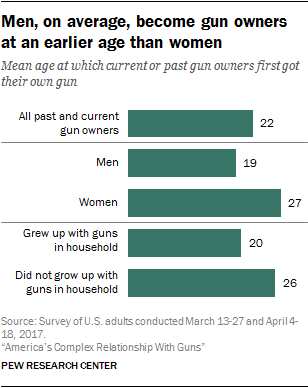 Among all current and past gun owners, the average age at which Americans say they beginning became gun owners is 22 years. Nearly 4-in-x electric current or past gun owners (37%) report that they were younger than 18 when they first got their own gun.
Among all current and past gun owners, the average age at which Americans say they beginning became gun owners is 22 years. Nearly 4-in-x electric current or past gun owners (37%) report that they were younger than 18 when they first got their own gun.
Current or past gun-owners who grew up with guns in their household report that they first became gun owners at an before age than those who didn't grow up in a gun-owning household.
About half of those who grew up with guns (47%) say they were younger than 18 when they first got their ain gun, compared with 19% of those who didn't grow up with guns in their household.
Among men who ain or have owned a gun and who grew up in a gun-owning household, 61% say they personally became gun owners before they turned 18; a quarter of women in the aforementioned group say they were younger than 18 when they offset got their own gun. On average, men who grew upwardly in a gun-owning household report that they first got their own gun when they were 17, compared with an average age of 26 for women who grew upwardly with guns in their household.
Overall, men who currently own guns or who have washed so in the past study that they offset became gun owners at historic period xix, on average; for women who own or previously owned guns, that age is 27.
Most Americans say they have fired a gun at some point
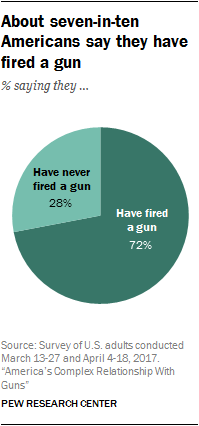 About vii-in-ten adults (72%) say they have fired a gun at some point in their lives. While this is particularly the instance among those who own or have endemic a gun (95%), nearly half of those who have never personally owned a gun say they have fired one (55%).
About vii-in-ten adults (72%) say they have fired a gun at some point in their lives. While this is particularly the instance among those who own or have endemic a gun (95%), nearly half of those who have never personally owned a gun say they have fired one (55%).
Large majorities of virtually nine-in-ten or more among current and past gun owners say they have fired a gun, and this is truthful across demographic groups. Amongst those who accept never owned a gun, however, there are some significant demographic differences in the shares who say they have fired ane. In many ways, these differences mirror the patterns in gun ownership.
For case, men who have never endemic a gun are more than likely than their female counterparts to say they have fired one (64% vs. 50%). About ii-thirds (68%) of whites who have never owned a gun say they have fired one at some point, compared with 32% of blacks and 35% of Hispanics who have never owned a gun. And while 68% of those who live in rural areas who have never endemic a gun say they have fired 1, about half of those who live in urban (48%) or suburban (56%) areas have had this feel.
Amid adults who have never personally endemic a gun, seven-in-ten of those who grew up with guns in their household say they have fired a gun at some signal, compared with 47% of those who didn't grow up in a gun-owning household. Whether they have or accept non personally owned a gun, the average age at which those who grew up with guns in the household say they get-go fired a gun is 14 years, compared with 20 years among those who didn't grow up in a gun-owning household.
Men who grew upwardly in a gun-owning household report that they commencement fired a gun when they were, on average, 12 years former. Among women who grew up with guns in their household, the average age at which they first fired a gun is 17.
Nigh Americans say society has a negative view of gun owners, only that people in their own communities wait at gun owners is a positive way
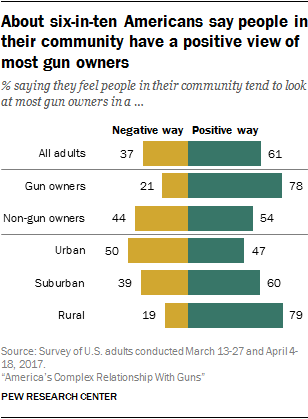 A majority of Americans say that society tends to have a negative view of gun owners, a perception that is somewhat more common among non-gun owners than among those who own a gun. About six-in-ten Americans who don't own a gun (61%) say society has a negative view of gun owners, while 38% say society'southward views are generally positive. Opinions are more than mixed among gun owners themselves: 54% say order tends to have a negative view and 45% say it has a positive view of most gun owners.
A majority of Americans say that society tends to have a negative view of gun owners, a perception that is somewhat more common among non-gun owners than among those who own a gun. About six-in-ten Americans who don't own a gun (61%) say society has a negative view of gun owners, while 38% say society'southward views are generally positive. Opinions are more than mixed among gun owners themselves: 54% say order tends to have a negative view and 45% say it has a positive view of most gun owners.
Americans have a unlike assessment of how people in their own communities view gun owners. Most (61%) say people in their community mostly view gun owners in a positive fashion, and this is peculiarly the example amongst those who live in rural communities. About eight-in-ten adults who alive in a rural area (79%) say people in their customs mostly have a positive view of gun owners; but 47% of those in urban areas say the same most people in their community.
Gun owners are far more likely than non-gun owners to say people in their community look at virtually gun owners in a positive way; 78% of gun owners say this is the case, compared with 53% of non-gun owners. Assessments vary between gun owners and those who don't own guns across community types, just differences are particularly pronounced among those who alive in urban or suburban areas.
For case, while 66% of urban gun owners say people in their customs generally take a positive view of about gun owners, less than half of those who do non own guns in urban areas say this is the instance (42%). In rural areas, gun owners are somewhat more likely than those who don't own guns to say people in their community expect at gun owners in a positive fashion, but majorities of both groups offer this assessment (85% and 74%, respectively).
Source: https://www.pewresearch.org/social-trends/2017/06/22/the-demographics-of-gun-ownership/
Posted by: lynchthouthe1935.blogspot.com


0 Response to "How Many Registered Gun Owners Are There In The United States Today"
Post a Comment